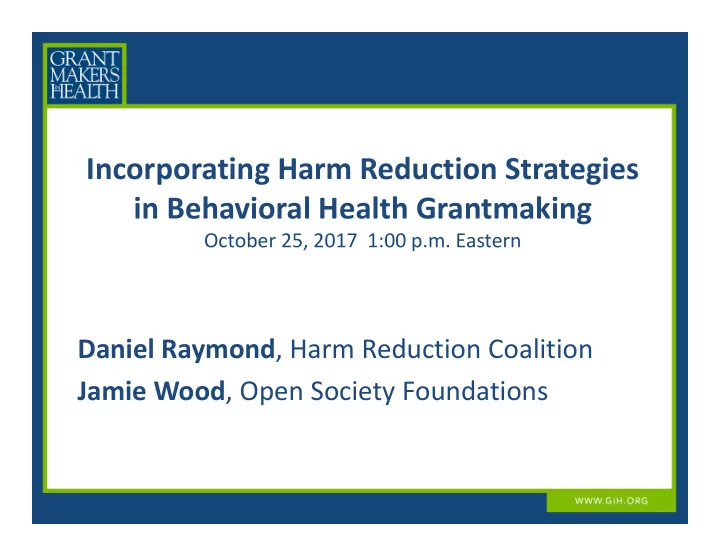

Incorporating Harm Reduction Strategies in Behavioral Health Grantmaking October 25, 2017 1:00 p.m. Eastern Daniel Raymond , Harm Reduction Coalition Jamie Wood , Open Society Foundations
Hol Holes in in the the Fa Fabric • Overdose epidemic makes visible the flaws and gaps in how we address substance use issues • What works well hasn’t been scaled up; what operates at scale has not worked well • Focus on opioids provides a vital opportunity to build support and durable infrastructure for responsive systems and resilient communities
Missing ssing Link Links • Majority of people with substance use disorders are not engaged in treatment, recovery support, or regular health care • Unaddressed challenges: perceived need for treatment; not ready to stop using – yet at imminent risk of adverse consequences • These patterns are exacerbated by stigma and criminalization, but not unique to substance use as a health issue
Harm Harm Re Reduction: Us User er ‐ Dri Driven en Adaptiv Adaptive Strategies Str gies • Listening to people who use drugs & working with their motivations and priorities • Meeting people where they’re at • Shifting knowledge, tools, resources, and access to empower people who use drugs as change agents Harm reduction creates in ‐ between spaces to facilitate community health and collective transformation
Harm Harm Re Reduction as as Pl Platform rms fo for Eng Engagement • Reframing goals: safety, stability, support • When we reject stigma, we restore dignity and agency to people who use drugs • Effective harm reduction programs provide a sense of place, purpose, and participation Layering services & supports on to the platform: counseling, treatment readiness, reproductive health….
Em Emer erging ging Issues Issues in in Harm Harm Re Reduction • Post ‐ overdose follow ‐ up and support • Moving diversion upstream & reducing criminal justice involvement • Resourcing and sustaining community ‐ based syringe access and naloxone distribution programs • Safer consumption spaces (i.e. supervised injection facilities) • Navigating and responding to community trauma
Opportunities Opportunities fo for Inn Innovatio tion • Gender ‐ informed strategies • Racial justice & equity • Rural adoption and adaptation • Cross ‐ sector collaboration • Family ‐ oriented approaches • Advocacy and thought leadership
Save The Date! What makes this conference so special? Participants and presenters include broad cross sections of: ‐ Advocates ‐ Researchers ‐ Practitioners ‐ Syringe Service Programs ‐ Policy Makers ‐ Innovators of systems change ‐ People in Recovery ** ‐ Active Drug Users **
Hence the significance of the Harm Reduction Coalition’s recent North Star Statement: Harm Reduction Coalition creates spaces for dialogue and action that help heal the harms caused by racialized drug policies. Worth 4 minutes of your time! http://harmreduction.org/about ‐ us/north ‐ star ‐ statement/
Lessons learned so far from fentanyl: ‐ Not just a problem with opioids; other illicit drug supplies are being laced with fentanyl as well ‐ There are ways of testing drug supplies to investigate whether they’ve been adulterated with fentanyl. We need to increase access to testing kits the way we’ve done, to some extent, with naloxone. And not just with law enforcement. ‐ Increased attention to and desire to consider developing supervised consumption rooms within the United States, which have been developed and evaluated in Western Europe and Canada
Other observations from overdose crisis: • Increased support for Medication Assisted Treatment • Not as much attentiveness to the key differences between methadone, buprenorphine, and naltrexone/vivitrol, and not as much broad support to let patients choose/decipher what might actually work best for them. • Pharmaceutical company dollars investing heavily in Vivitrol, and skepticism is warranted surrounding the motivations of why it’s being promoted and supported at the exclusion of other forms of MAT. • Increased support for involuntary commitment in residential drug free treatment programs. • Need for attentiveness to what happens after requiring withdrawal, but not attending to what happens after and in the longer term.
Diversionhub.org • Stay tuned! Harm Reduction Coalition will be collaborating with Open Society Foundations and a number of other partners to support the development of pre ‐ booking and pre ‐ arrest diversion modules, specifically to incorporate the voices of directly impacted communities.
Questions? Please type your question into the Chat Box or press *6 to unmute your phone line and ask a question
• More webinars on this topic? • New topics you want to tackle or learn more about? • Innovative work that you want to share? • A question you want to pose to your colleagues? Contact us at bh@gih.org
Recommend
More recommend